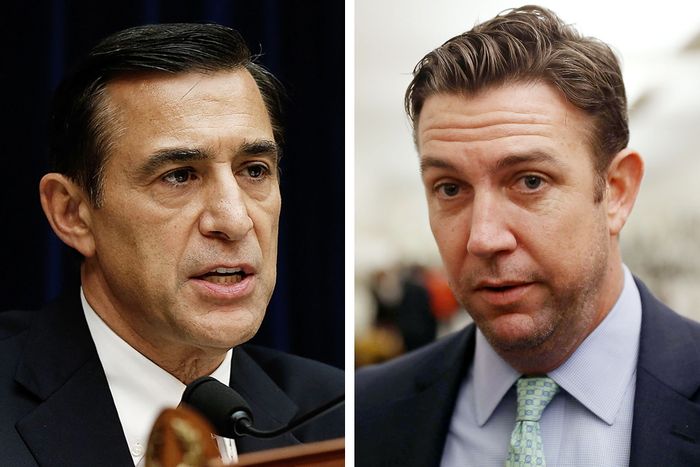
August has been an up-and-down month for embattled California Republican congressman Duncan Hunter. On the positive side, he won a delay from September until January for his trial on felony charges of using campaign funds as a personal bank account in massive and often hilarious ways (campaign donors probably didn’t intend to pay for the cost of drinks consumed during extramarital affairs, as prosecutors claim, for example). This gives Hunter more time to pursue a legal strategy that isn’t simply a combo platter of blame-shifting to his wife (a co-defendant who is cooperating with prosecutors) and of unsubstantiated claims that the whole prosecution is a deep-state plot by lefty prosecutors in William Barr’s Justice Department. And who knows: Perhaps Hunter thinks he can get the trial delayed again, until after his 2020 primary next March. He did, after all, win reelection in his heavily Republican district in 2018, despite the pending corruption charges with a pungent aroma of financial and personal irresponsibility.
The really bad news for Hunter is that the odds Republicans will stick with him again have really gone down. He has already attracted five Republican opponents for the top-two primary next year, including one — former San Diego councilman Carl DeMaio, a drive-time radio host known for spearheading opposition to a Democratic gas-tax hike in California — whom Cook Political Report’s David Wasserman considers formidable. And now it’s getting much, much worse for the incumbent, as The Hill reports:
Former Rep. Darrell Issa (R-Calif.) has taken his first formal step toward a return to Congress.
The former House Oversight and Reform Committee chairman has created an exploratory committee to run for the San Diego–area seat now held by his GOP colleague, Rep. Duncan Hunter, who is fighting federal corruption charges.
Issa represented a neighboring congressional district for 18 years before retiring in January.
Issa, probably best known for his incessant pursuit of Hillary Clinton in connection with the intensely partisan House investigations of the 2012 attack on U.S. personnel in Benghazi, Libya, chose not to run for reelection in the 49th District of California last year based on very solid evidence that he was about to lose (Democrat Mike Levin routed Republican Diane Harkey there by a 56/44 margin). Even back then he flirted with the idea of switching districts and running against Hunter, whose 50th District is significantly more Republican (Trump carried it by a 55/40 margin in 2016). Now it looks like Issa is headed in that direction.
Without Issa in the race, California’s top-two system meant an almost certain general-election spot for Democrat Ammar Campa-Najjar, who came within four points of winning in 2018, giving Hunter a relatively small target of votes to finish second over scattered Republican opposition. But Issa would change everything, thanks to his local and national fame, and just as important, his vast personal wealth (for years he was acknowledged as the wealthiest member of Congress). As you might imagine of someone who is alleged by prosecutors to have run up (with his wife) $37,000 in bounced check fees, Hunter is not so fortunate.
Other than Hunter himself, the 50th District resident most likely to be unhappy with Issa’s approaching footsteps is Campa-Najjar, whose 2020 prospects are heavily dependent on again facing the incumbent. The Democrat already had to endure a nasty smear campaign by Hunter in 2018 suggesting he was a terrorist (based on his Palestinian grandfather’s actions long before he was born), despite many testimonials from his friends and neighbors (including fellow parishioners in an Evangelical Christian church) in San Diego. Having to suddenly face Issa’s bank account hardly seems fair for Campa-Najjar, but he is clearly a persistent man — much like Duncan Hunter, who would probably be well-advised to work out a plea deal that includes a resignation from Congress.






























